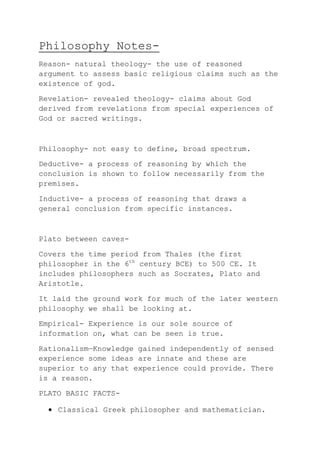
Notes
- 1. Philosophy Notes- Reason- natural theology- the use of reasoned argument to assess basic religious claims such as the existence of god. Revelation- revealed theology- claims about God derived from revelations from special experiences of God or sacred writings. Philosophy- not easy to define, broad spectrum. Deductive- a process of reasoning by which the conclusion is shown to follow necessarily from the premises. Inductive- a process of reasoning that draws a general conclusion from specific instances. Plato between caves- Covers the time period from Thales (the first philosopher in the 6th century BCE) to 500 CE. It includes philosophers such as Socrates, Plato and Aristotle. It laid the ground work for much of the later western philosophy we shall be looking at. Empirical- Experience is our sole source of information on, what can be seen is true. Rationalism—Knowledge gained independently of sensed experience some ideas are innate and these are superior to any that experience could provide. There is a reason. PLATO BASIC FACTS- Classical Greek philosopher and mathematician.
- 2. 427-347 BCE Lived in Athens for most of his life Founded the Academy in Athens. The first uni. Mentored by Socrates, mentored Aristotle and together they laid out the foundations of western philosophy. The republic- 350-370 BCE Key questions that we’re going to cover- What is justice? Is it always better to be just than unjust? Analogy of the Cave is in The Republic Plato believed in 2 worlds – a physical, unreal world and a spiritual, perfect world. This is an important debate in the philosophy of religion. Plato argued our sight reveals a world of shadows but if we ascend into the upper world, we will see true reality. Ultimately we will see the Form of the Good, which is responsible for whatever is right and valuable in anything. PLATO Most people are imprisoned by their misconceptions that the shadows are the true world. The shadows (the objects we see around us) are poor reflections of true reality – the Forms The cave is the world as we see it, a distortion of the truth. It is distorted by our refusal or inability to pursue philosophically the journey to truth. The journey out of the cave is the sometimes difficult philosophical journey to truth. When those who have seen the truth return to persuade others, they think the others are fools due to their restricted perceptions Plato’s forms- Plato believed true reality existed beyond normal perceptions of the world. What we perceive around us is a shadow of the truth. This ‘other world’ was inhabited by the Forms, such as justice, goodness and beauty. Forms such as colours participate in the objects around us. We might find a piece of music beautiful, or a sculpture, beauty is participating (meaning is present) in these things, but beauty itself is beyond our perception. Plato-
- 3. Protagoras (c.490-420 BC) thought you could only ask ‘What is good for you?’ But Plato thought you could ask ‘What is goodness itself?’ Goodness was the highest form of reality, an object or absolute thing that existed eternally, beyond our limited world. Plato was an absolutist. Forms could not have made such a distorted world. Plato believed in a demiurge (a creator God) who took the pre-existent matter and space and gave it geometric shape. Forms and their perception- Are only available to the higher minded (like yours) philosophers who have been educated. This leaves the majority cut off from the truth. The Forms exist beyond the empirical realm and so cannot be proven to exist or not exist. Plato relies heavily on human mental ability to escape the shadow realm. Aristotle on the forms- Aristotle agreed with Plato that the Forms were the object of rational thought but there were no proof. Forms do not say much about the world, they point beyond it, and they don’t explain the movement of things. Aristotle believed that Forms could not exist as things in themselves beyond this world but only as part of the things in the world. They are not objective universals. The Form is involved in matter and expresses itself in matter, which has a purpose. It has an objective sense through the substance it exists in, i.e. there is an idea of ‘horse’, which expresses itself through horses and gains some degree of objectivity through that expression. Critical comments on the Forms- Frederick Copleston (1907 – 94) explains Plato’s view that we could perceive truth through our mind: ‘Plato means to establish ascertained truth. He firmly held that we can, and do, apprehend essences in thought, and he firmly held that these essences were not purely subjective creations of the human mind…Reality can be known and reality is rational; what cannot be known is not rational, and what is not fully real is not fully rational. Ideas about cause and purpose in relationship to god- Aristotle (c.435-350 BC) Metaphysics Book 12 Objects change in a number of ways and those changes are caused; nature does not act without purpose. If there is any change in the universe, there must be something that initiated the change The final cause behind everything is the Unmoved Mover, which is a pure immaterial being or pure immaterial thought; self-subsistent and self-contained. Metaphysics book 12-
- 4. The Unmoved Mover is intelligence or thought. Aristotle never talked about God in personal terms or in anthropomorphic terms as the Greek gods were described. God has no divine plan and does not know the world Aristotle does not explain where the matter for the world came from. Was it caused too? There is a disparity between an entity powerful enough to set the universe in motion but unable to know it.